The Year of Naked Acts
“Naked Acts” (1996) is now on DVD/Blu-Ray and digital. Here’s how the discovery happened. +A Giveaway!
Black Film Archive is a living register of Black cinema. This Substack is its blog. Today I’m shining a light on the other work I have the privilege of being a part of: film restoration. Here’s a Q&A with Bridgett M. Davis, the director of “Naked Acts” (1996), which is on DVD/Blu-Ray today! I’m giving away a few copies of the disc. Details below.
My life’s mission became crystal clear when I met Bridgett M. Davis, writer and director extraordinaire, in the fall of 2022, a year after Black Film Archive’s launch. A few weeks before this fateful gathering, I had the pleasure of viewing her 1996 undistributed feature, “Naked Acts” in a screening room at Indiana University’s Black Film Center/Archive where I was a guest film programmer and lecturer. Upon viewing the first few scenes of Davis’s film, I wrote down in my research notebook ‘How do I get this film out in the world?’ It became clear in the whirlwind of those weeks of originally viewing the film and meeting Davis that the ‘power’ and trust I was amassing in the industry meant nothing if it could not tangibly support the filmmakers within the Archive and beyond. From a DM I sent to the director on Twitter simply asking if she would like me to advocate for the film’s distribution to the months of discussing what it means to bring this Black woman’s film back out into the world, we developed a kinship that changed the course of my life. 1
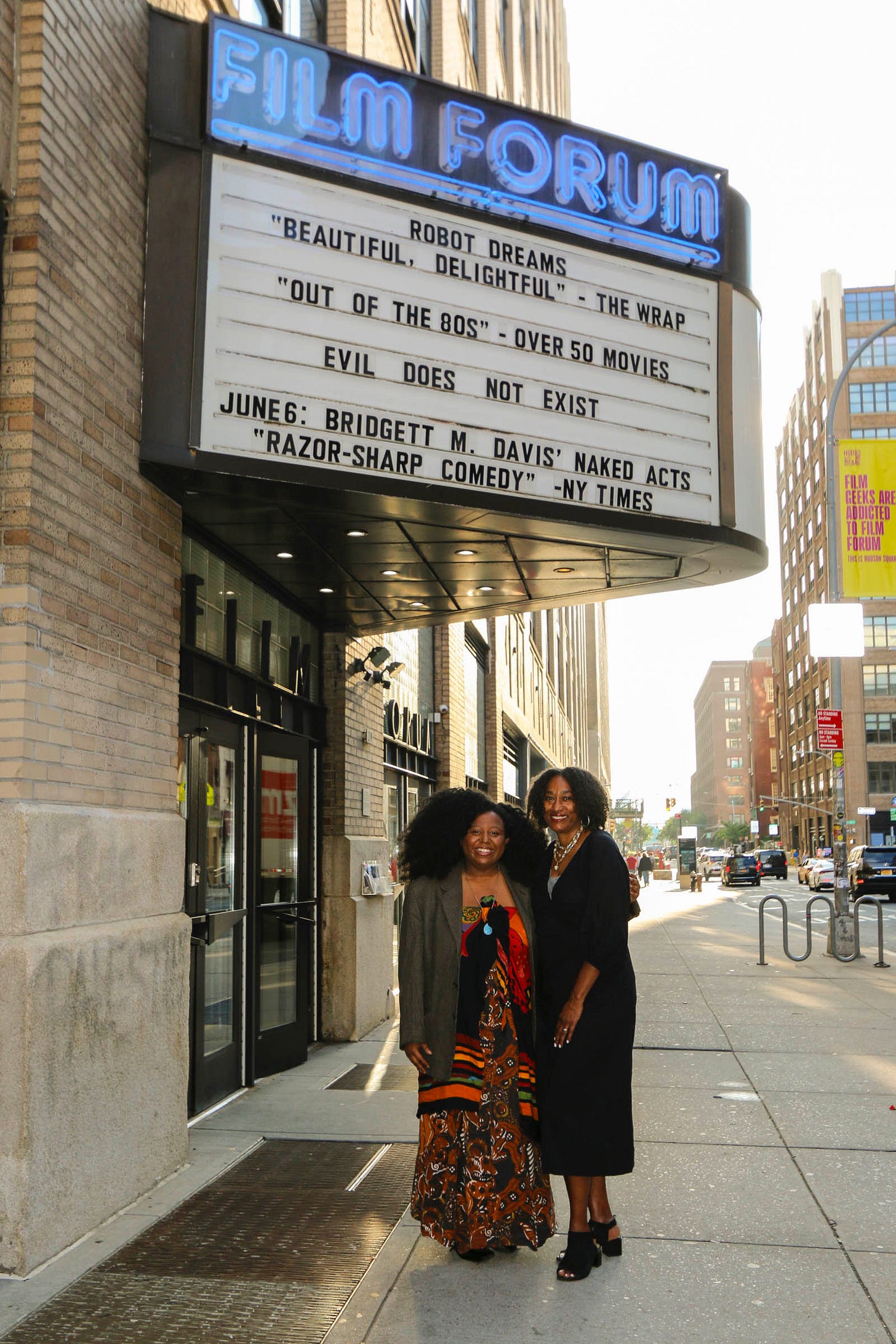
“Naked Acts” centers CeCe (the incredible Jake-Ann Jones), a third-generation Black woman actress who just landed her first big role after shedding pounds. The film within the film, directed by an old boyfriend (the great Ron Cephas Jones), requires CeCe to pose nude and confront the body image issues and emotional tolls that are not visible to the naked eye. “Naked Acts” also stars legendary photographer Renee Cox and Sandye Wilson as Winsome. With Bridgett Davis’s tender hand, the weighty issues of sexual abuse and body image issues receive a lightness that illuminate the full potential of the Archive’s possibility. This moment arrives, which we discuss at length in the Q&A below, after Davis’s feature debut was pushed to the margins when the industry couldn’t figure out how to support this film and filmmaker.
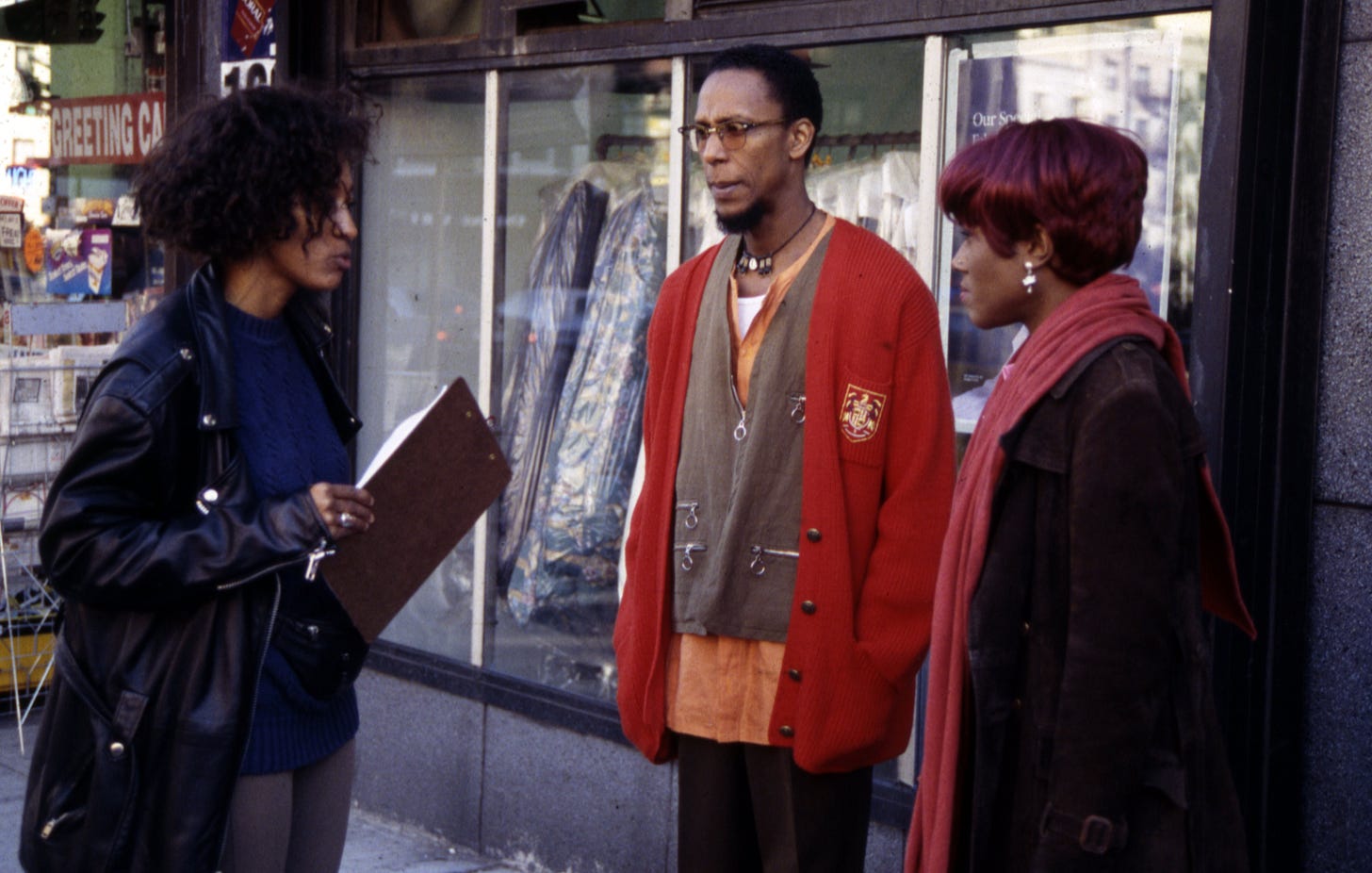
In the last year Bridgett and I have had the privilege of traveling the world with the film. From the best opening of a repertory film in the last five years2 at Brooklyn’s BAM cinema, a sold out night at New York’s Film Forum, and an international debut in Rotterdam… we spent much of the year with people asking "How have I never heard of this?” Richard Brody, writing a review in the New Yorker last summer, sums it up best: “The rediscovery of “Naked Acts” expands film history.” That expansion is an opening for us all to consider how we can support Black filmmakers known and unknown, here and yet to come.
The DVD/Blu-Ray of “Naked Acts” is available today and is jammed packed with archival footage, an exclusive interview with me and Bridgett, and more! Davis, who was pushed away from her first love of filmmaking, turned to book writing. You may have read her international bestseller, “The World According to Fannie Davis,” on her mother. On March 11, Davis will debut her new memoir on her sister, “Love, Rita,” a tender celebration of sisterhood and the grief that often tinges Black woman’s lives. I’m doing a special giveaway of “Naked Acts” and “Love, Rita” with the details below the Q&A. 3
Maya Cade: I really want to begin with grounding how we got to this moment. How did we meet each other? Can I hear that in your own words?
Bridgett M. Davis: We met because I willed you into my life. (laughter) I knew about Black Film Archive. I knew about it through Twitter like most people. I loved what I could see that you were doing. I saw very clearly that you were focusing on films of earlier decades4 and I made a mental note. I had two thoughts. "Oh, I wish she could know about “Naked Acts,” and also, if she makes it to the '90s, I'll have a reason to tell her." That was my thought and I let it go. I was used to that. I was used to thinking, "Oh, there'll be a list out there and “Naked Acts” won't be on it."
It wasn't unusual for me to think, “Oh, maybe I'll have a reason to tell her about the film," but of course, I didn't have to because you reached out to me. It was so beautiful because I think you might have said, "This is who I am." You introduced yourself and you told me you had just seen the film in the archive. What I loved so much was that I could say to you, "I know exactly who you are" because I was hoping you would know about “Naked Acts” and that really started everything between us.
Maya: I think so. A part of the beauty from my own perspective is that I was also seeking “Naked Acts.” It wasn't like “Naked Acts” was hidden. When I saw it, within a few minutes, I'm sitting down scribbling, "My God, how do I have the privilege of working on getting this film back out in the world?" To reach out to you was just to say, "What can I do? How can I use my power to ensure that this film can see another life?"
Bridgett: I tell you, when you asked me was I interested, of course, I was like, "Yes," but I had no concept, really, of what could happen. I had no idea that it could do what it ended up doing. I thought, "Oh, this is great. Maybe it'll get redistributed on DVD for a new generation and that would be wonderful." That was my thought. A restoration was not in my mind at all when you reached out originally. Certainly theatrical, that was beyond anything I would have imagined for the film.
Maya: I think what's so beautiful is that all of these steps happened with such ease in a way that I want to make clear that ease is not usually what happens in restorations. Often the elements are missing or the funder hasn't come through because restorations, of course, cost money. Before I get ahead of myself and talk about that, I do want to point for the record that something I made clear, after you said yes and after Milestone agreed, then I came back to you and I said, "Would it be okay if I'm involved with the release?" How did you feel about that then and how do you feel about that now?
Bridgett: I'm not even sure we had dinner yet. I don't even know if I had met you in person yet. I was so clear that that's what I wanted. I knew enough. I didn't know you well, but I knew enough. What did I know? I knew that you were an advocate, a genuine advocate for Black film. Already that was enough to make me want you to be part of it, but I also could tell that you really cared about the film; the way you spoke about it, the way you literally reached out. Just that act alone said so much to me. You could have seen the film and liked it and decided you would maybe write about it at some point. You didn't do that. You said, "This film should be out in the world."
What an act of agency. Really, it felt like such a vote of confidence in my work, in what I had created that I knew enough to know I needed. That if you were offering to be an advocate, I wanted that because I was entering into a dynamic with a distributor, I didn't expect it to be problematic. It wasn't. Also, I knew it would be smart to have someone who's on my side, on my team advocating for me.
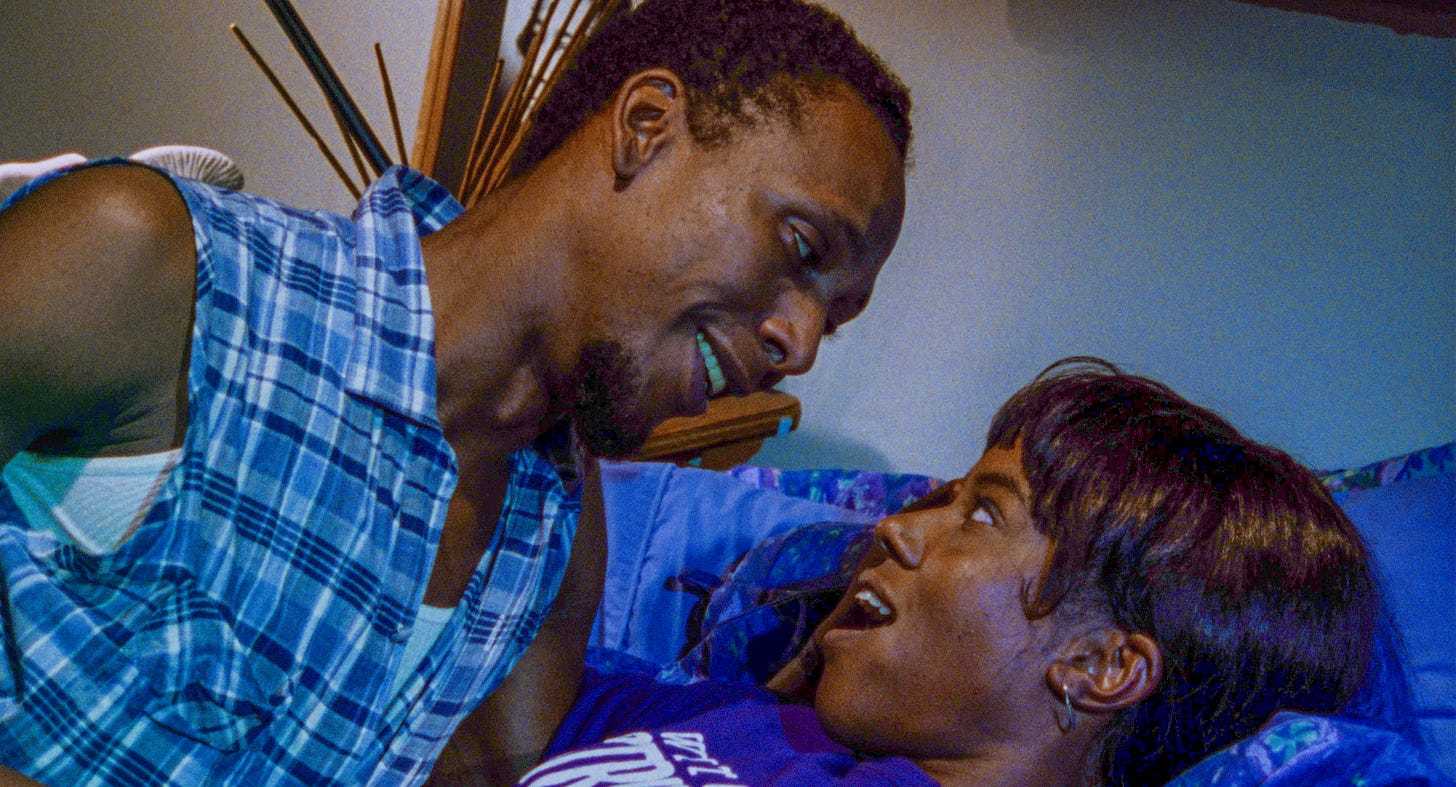
Maya: I think this brings up a really interesting point, which is that so much of how distribution happens is that a Black film will come out, and then White people, because so often, that is just the nature of the world, that White people will make decisions on behalf of film that reflect selling it to a White audience. What I was very clear about at the very beginning, and what I'm always clear about, is that this Black film has served a Black audience, why don't we think with them in mind?
Bridgett: Which was radical, quite frankly. It feels in some ways like I've known you forever, but it's really been just two and a half years?
Maya: Two and a half years. In all of this time, we've talked a lot about distribution and its practices. We have really landed on agreeing that so much of what you can hope for as a Black filmmaker is that a White person has a vote of confidence on it. That all of these distribution channels depend on each other. So much of how distribution happens, it means that you need a New York Times review. That most likely, especially at the time of when “Naked Acts” was originally released, that a White critic [and programmer] has to believe in the film.
Bridgett: Yes. You need the double whammy of a Sundance screening, certainly back in the '90s you did, and then you needed a [Variety critic] to come out of that screening and say amazing things about it. That then would give it an audience with distributors. You needed both. If you had one and not the other, which is what I had, it wasn't enough.
Maya: What does it mean to repair the knowledge of a film? Because I feel very fortunate that you are here and you can advocate and express how you feel about the film and filmmaking yourself. I think something that's always been a scorn by my side, if you will, is that the circumstances around “Naked Acts” meant that you had to pivot and do something else. That you, a person whose whole life you wanted to be a screenwriter.. and that so much of the Black dream of filmmaking depends on whiteness in the very way that the world is constructed. What does it mean to repair your own ambition and public knowledge about this Black film? How does that register to you?
Bridgett: It's extraordinary. Not just because there's a possibility that I might be able to make another film, a second film. That's beautiful in and of itself, that I can have that possibility out there for the first time in decades. That's great, but really, it's validated. That's the strongest word I can use because I knew everyone who invested in and gave themselves of the film knew in real time that we were doing something important. All of us knew we were saying something that hadn't been said, and we also all knew that Black audiences were hungry for it. All of those things were true and we pushed it as far as we could with the limitations of what we had, the festival circuit, basically. When that ended, then the ability to get it out in front of audiences ended. This is not just validating because, as Richard Brody told us all, it really places the film in the cannon where it belonged. Now, it, what is his word? It reimagines? No, what is the word he used so beautifully?
Maya: The rediscovery of “Naked Acts” expands film history.
Bridgett: Expands film… Yes, that is as exciting to me as anything that you have to come to film history differently now because it's been expanded because what had been omitted is now included. It changes your whole understanding of specifically, he didn't say Black film, he said film history. There's that, but also certainly what people thought of as the films by Black filmmakers back in the day was not complete. It wasn't complete, not because an artist like me stepped forward to put a new voice out there and to say some things that I felt needed to be said, but because gatekeepers kept it out of the conversation.
I'm so excited and grateful and thrilled and yes, once again, feeling lots of validation because what I originally wanted is happening. It's now happening. In 2024, my film moved through the country. Two dozen American cities. People got to see this film. Never mind, nine or so other international screens. That was always my hope for it that it would find its audiences, plural, but it is a little different from just, oh, I wanted distribution. I feel as though what it has today, it couldn't have had maybe even originally, is context and lived lives so that people really understand and appreciate what they're seeing because they now know it's rare. When someone sees my film for the second time having seen it in the '90s, they often say to me, "Oh, I forgot how much was there and how relevant it still is." Which is another way of saying we don't have enough in the culture that's addressing these issues still. In a beautiful way, it's meaning is richer for me now.
Maya: That's so beautiful. I wonder if you can take us to-- I know, of course, Julie Dash presents “Naked Acts” to the world. A part of that, when she agreed to sign on as a presenter, you reminded me that so much of this is exalted from you seeing Daughters of the Dust at film form in the '90s. Can you take me back to that full-circle moment?
Bridgett: Oh, it was beautiful. It was January [‘92]. Long lines out front for this film. I finally got in. One of the last people to get a ticket that day, so I was in the front row, but it didn't matter because those images literally washed over me. I was, I believe, at the very beginning stages of writing “Naked Acts” and learning filmmaking. I was in the throes of figuring it all out. It was very exciting for me, but I hadn't understood the extent of possibility for myself until I saw Daughters of the Dust. It hit me so hard. I was like, "Whoa, wait a minute. I can do anything. I don't have to limit myself. I can go all in on what I really care about." My film is not like Daughters at all, but it is in the sense that it's all me. It's all my issues, my voice, the things I was obsessed over. It was so about giving me permission to just do what I really felt was important to me because up until then, I had some underlying sense of what was allowed and not allowed in the space of Black film. We didn't have that many examples at that point. Not many at all, really. In… '92, there weren't very many examples at all. Not contemporary ones. There was a sense that certain kind of films got made. What might have happened had I not seen that film right at that nascent point for me.
Maya: That's so fair, and then to have [Julie Dash present it]5 over 30 years later.
Bridgett: It's very poetic because for Julie Dash to essentially validate the film and provide what is really a beautiful endorsement of it means so much to me because I know what her film meant to the creation of mine.
Maya: It's true poetry. I think so much of Black film history is a call and response, right?
Bridgett: Yes.
Maya: Julie Dash put out a call and in many ways, “Naked Acts” response to that call.
Bridgett: I love that, she put out a call. Yes, she really did. I had an experience when I showed my film. Actually, it was just a talk I gave in Philly for Seen magazine after I'd written an essay for them. They had a launch party and a young woman came up to me, she had seen the film, and she said that, "Your film's now my favorite film. I'm a film student and it's really just changed what I think I can do." Of course, this made me think of myself in that movie theater at Film Forum in 1992. I thought, if there'd been no re-distribution, if there'd been no re-release of this film, if it hadn't had a re-discovery, she wouldn't be standing in front of me saying that.
One person, maybe more, but one person I know of went to that archive. That is what enabled this film to have a new life. What does that mean? It means that people like that young woman, that young filmmaking student could see the film. You didn't just see the film, you read my materials.
Maya: I did. (Laughs)
Bridgett: I was like, "Wow."
Maya: I was in the weeds.
Bridgett: It's like you're also a student of film too.
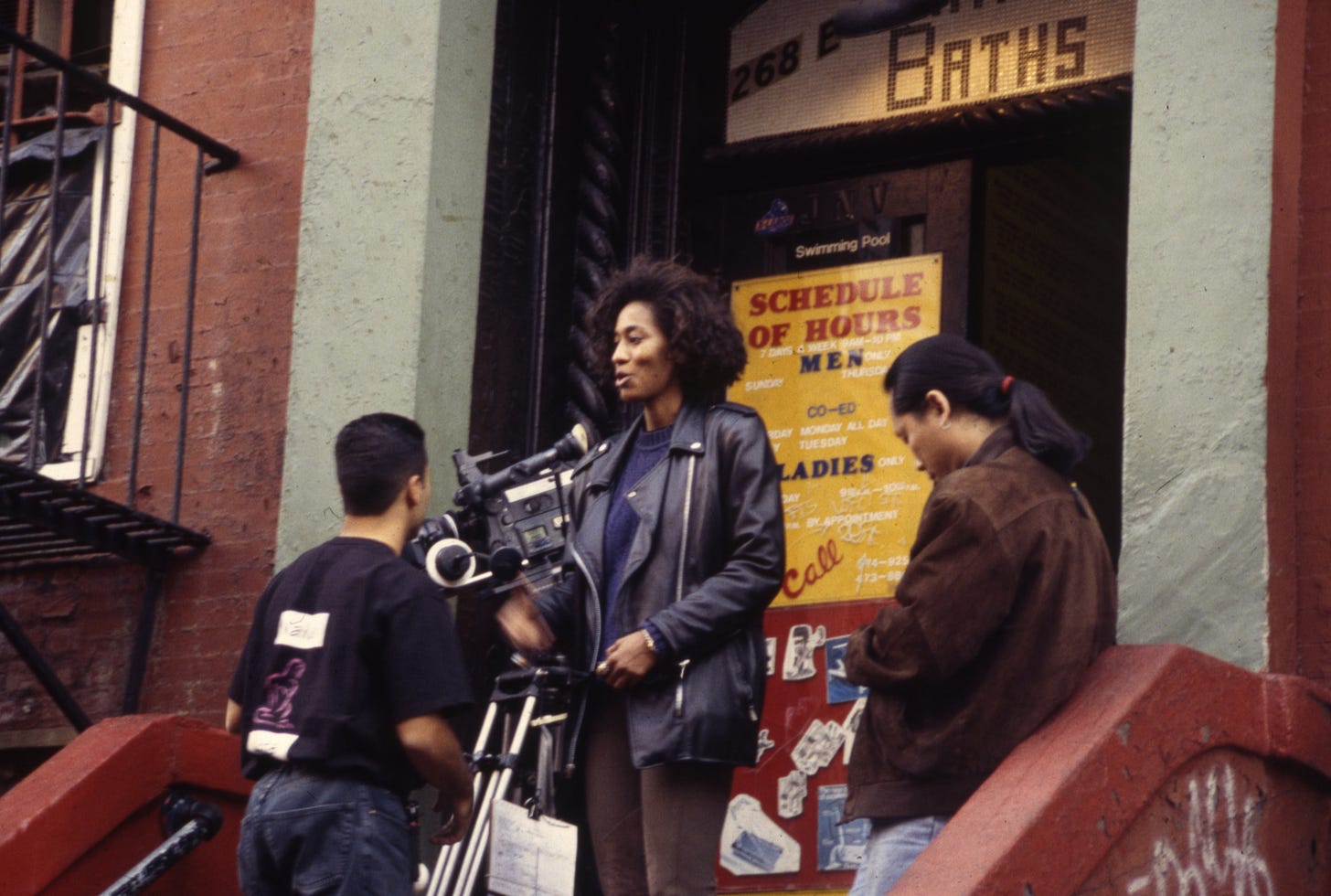
Maya: I want[ed] to know the full context of who you are. You happen to be the first person I've ever approached about getting distribution, but in the months and years since, I've approached a few people who have essentially said to me, "Not every rock is meant to be unturned. I appreciate what you're doing. It's no disrespect. It's just I've been so burned by this industry that I don't know if I have the heart to potentially go through heartbreak again. “
Bridgett: See, I wasn't that way at all. You saw… Because in a way, “Naked Acts” had a charmed existence even in the beginning. I would say, given the fact that it got made, it got funded, it got completed all of that was unusual. I have a dear friend who was Kathleen Collins's student. Her film never made it out of the can. You see, and that wasn't an unusual thing to happen. People told me, "Bridgett that was fast." They felt that because I started shooting in the fall of '94 and I was screening a cut of the film at the Black Harvest Film Fest in Chicago the following July, everyone said to me, "That is fast."
It felt charmed in a lot of ways in the whole making of it. Of course, it was the hardest thing I've ever done in my life, but the feelings around making it were all powerful because it really was a community experience that shifted everything for me in terms of what you can do when you come together to create art. That feeling is what lingered for me around the film. Yes, it should have been treated better in terms of distribution, but how surprised was I? I was more hurt than surprised.
Maya: That's really fair. In this year of touring “Naked Acts” around the world, I think the thing that sticks with me is how many people are so moved after seeing the film that they are suddenly like, "I need to go create something. I need to go do something… I need to go call a friend." We won't know what it inspires, but we do know from touring the world with it that people feel like this is a call for them. The same way Julie Dash was a call for you, that this is now a call for another generation of filmmakers or artists to make something that, if I could sum it all up, that exists without translation.
Bridgett: Definitely. To see people still moved by it, it's so incredible. People are even inspired by my crazy story of it taking 30 years.
Maya: Yes, because it's never too late. The biggest blessing, and I'm going to say it again, is that you are here to speak for yourself. Something that I know that I will put on the record too is that when we met, you had just retired from being a professor at Baruch College. You said to yourself, "I need to make space for something to happen. For something else, more writing, all the things," and I come to you a few months later. That's cosmic.
Bridgett: It was completely cosmic. The retirement wasn't even official. You're like you retire and you don't have to teach that next semester and it doesn't become official until January. I met you in October. It wasn't even "official", but yes, when I tell you how strong that feeling was, both strong and amorphous.I just kept thinking, "I need to free myself for the next thing."
Maya: Oh my gosh, and the next thing came knocking almost immediately. [laughs]
Bridgett: It came immediately and I was like, "Ooh." Even then, I didn't know the extent or the magnitude of what we were going to do, but I remember thinking, "Oh, okay, I've got more time now to help with this," which I thought was a minor thing. I had no idea what it was going to involve, and yet, I was here for it. There was no tension of having to balance it with my job, so I can just enjoy it. Yes, I can come and look at color corrections. Yes, I can be there for the premiere of the film after it's been restored. Sure. I could travel to Rotterdam, no problem. We can talk about the poster design all you want. I'm here.
Maya: I will say every detail was so exacting. I think that's something to really talk about, is that there was so much discussion, not just about how to present this older film and make it new, of course, that's a consideration, but “Naked Acts” didn't even need that much [work.] It speaks across generations. At least, one of my things and what I alluded to earlier is that, how can we ensure that Black people want to hang this poster on their wall? I was so clear about that being my goal. What does that look like?
Bridgett: I have to say this, you were not quite a year old when we wrapped on December 4th of 1994. Because you came of age when you did, because of who you are, because of your influences, because of your intellect, because of where we are in the culture, because of your millennial self, you were ready to provide context for why this film was of value in a way that even I, as the filmmaker, could not have done. You brought that, that bled into your consulting for the film because you brought your contextual understanding of what this was. You knew more than any of us what this was and how important it would be that we were doing this. You knew it in a way, I think, the rest of us didn't quite because of what you brought to it.
Your passion, your knowledge, your interest, your life's work. That manifested in many ways, and at least of which was your insistence that the poster should be something that brought me joy, that made people want to hang it on their walls, ie, that reflected the complexity and beauty of the film as you saw it. You got into it with me.
Maya: I will say, for the record, this poster took probably three months to make.
Bridgett: It was the one thing that ended up [taking the longest.] It wasn't the sound or writes or music or issues with the [film] negative. It wasn't any of those big things that usually trip up a restoration or release. It wasn't about rights being tied up or hopefully, my ego wasn't too large in the process and getting in the way. It was the poster.
Maya: It was the poster. I think something that often happens to Black films upon re-release is that it's like, "Okay, we got the rights. It's time to go." I think you [only] have the opportunity to present something once. What is that one thing we want people to take away? This is the visual cue that announces the film.
Bridgett: Oh, you slowed that process down. (Laughs).
Maya: I did. I'll take full credit for that. I thought we only have one chance. I can't have this film come back out into the world and I felt like we didn't give it our all. That's what we're here for. It's proudly hanging on my wall.
Bridgett: Very proudly hanging on mine.
Maya: I think one of the biggest honors of my life is my name being even loosely associated with “Naked Acts” because the film is just such a wonder. It really cracked me open. To see new possibilities for what cinema can be. I'm so often asked, "What's that one film that you feel like that changed how you felt about Black film history?" and what I can finally say is that “Naked Acts” is that film.
Bridgett: Oh, Maya, that's saying a lot. Coming from the woman who, when I met her, said, "Oh, yes, I go to the movies twice a week."
Maya: (Laughs) I do have a final question for you, though. I think that your gift in this world is taking grief and moving it into art. Many people do not have that gift. Of course, you have this fabulous book coming out about your sister who passed. As you think about “Naked Acts,” and you think about this book how is that work intertwined for you?
Bridgett: That's a great question. I think that I wanted to create a character in “Naked Acts,” Cece, who acknowledged her loss and her grief, and then found a way to channel it into artistic expression while holding on to her integrity, and that's what I've always tried to do. When it works, I tell you, it has this beautiful way of both honoring your loved one and immortalizing them because people then want to talk about them.
It's early in the process because the reviews are just coming in. The book doesn't come out until March 11th, but one of the early reviews from BookPage, the critics said, "Just as Bridgett Davis said in her sister's memorial service, you're going to feel the same way when you read the book, that Rita was unforgettable." That's all I was trying for.
Maya: Aw, and Rita is. “Naked Acts” is.
Bridgett: Rita raised all the early seed money for “Naked Acts.” She raised all the initial seed money from local businesses that our family had patronized, friends, relatives, coworkers, ex-boyfriends. She went around and got all the original seed money for me that enabled me to launch into the project. She's all over the film. She's listed as an associate producer. This is all intertwined for me. I'm honoring something that we all did collectively and so many people who contributed to “Naked Acts” are not here in a physical sense anymore, but listen, I don't have to tell you about the power of film and its way of capturing people for eternity.
Maya: Wow. That's exactly it. Oh, I'm so honored.
Bridgett: I'm really grateful.
“Naked Acts” is available on DVD/Blu-Ray today. “Love, Rita” hits stores on March 11, 2025. You can pre-order it here.
Giveaway Rules:
Free Subscribers: Write a comment below and tell me your favorite film by a Black woman to enter. There will be (2) two winners of this prize. The giveaway will comprise of a copy of “Naked Acts” (1996) on DVD or Blu-Ray (I will ask your preference) and a hardback copy of “Love, Rita”. I will draw the two winners on 3/1. I will draw the two names from the comments on 3/1 and contact the lucky winners shortly after.
Paid Subscribers: There will be (2) two winners. You don’t have to do anything to enter. I will randomly draw two names and send you an email. The paid subscriber gift will be a copy of “Naked Acts” (1996) on DVD or Blu-Ray (I will ask your preference), a hardback copy of “Love, Rita,” a copy of a rare Black film book in my personal library, and a handwritten letter of films to watch after “Naked Acts” on Black Film Archive. I will draw the two names on 3/1 and contact the lucky winners then.
“Naked Acts” is the first film I’ve had the privilege of being a part of from discovery to distribution. So the act of that truly did change the course of my life. :-)
This was true as of its premiere at BAM! :-)
Details of the giveaway are directly above these footnotes.
When Black Film Archive launched it originally focused on films pre-1980.
When a director presents a film in distribution terms, it means that they give it their stamp of approval.



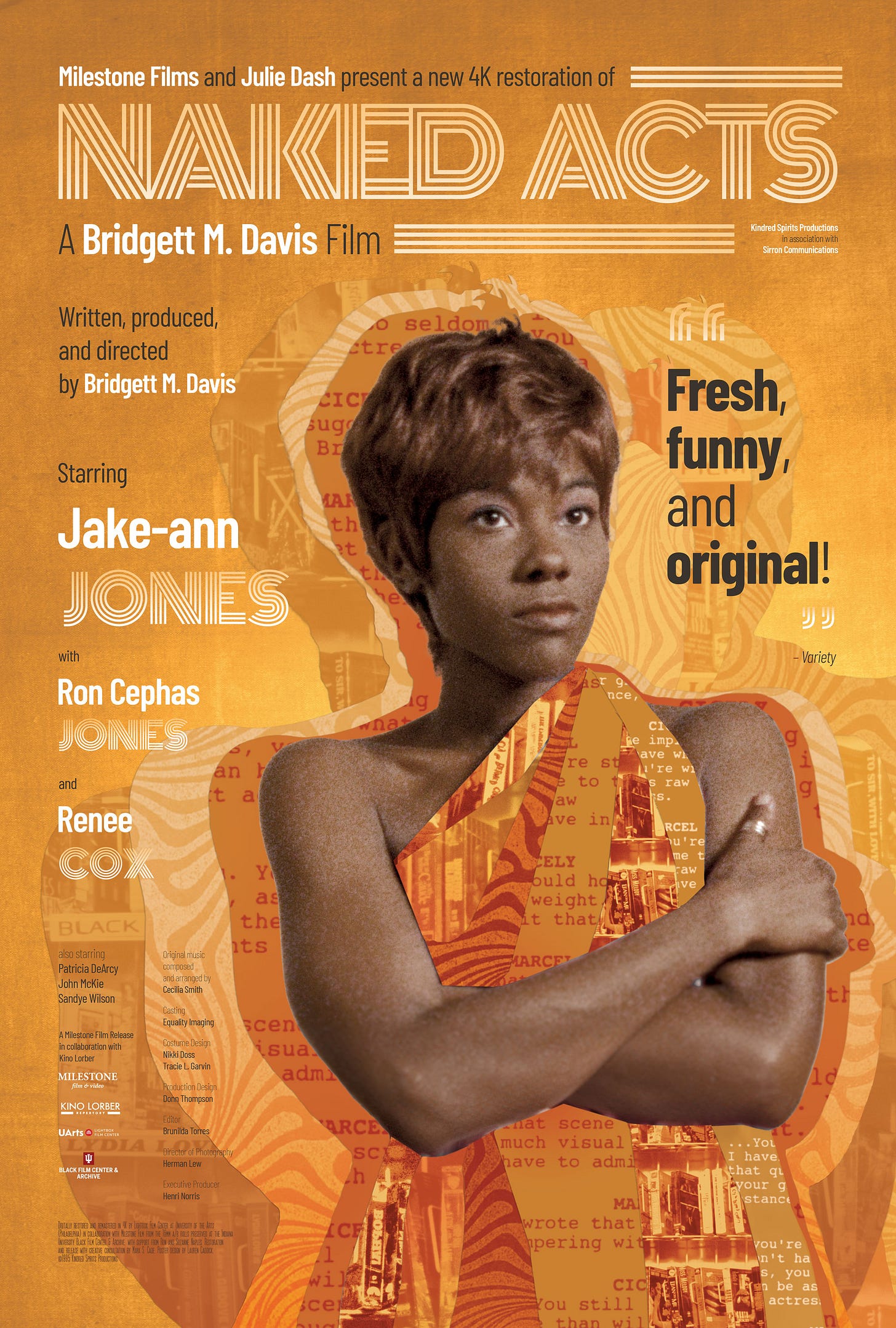
I'm looking forward to watching Naked Acts. I'd love to see it added to the Criterion Collection. So much of Black film history is lost or forgotten. I'm still discovering more of Oscar Micheaux's work. Thanks again for your admirable mission to resurrect and keep our cinematic history alive.
Favorite has to be Losing Ground, Kathleen Collins—desperately wished we could have gotten more feature work from her, but she definitely left us a beautiful piece of cinema.